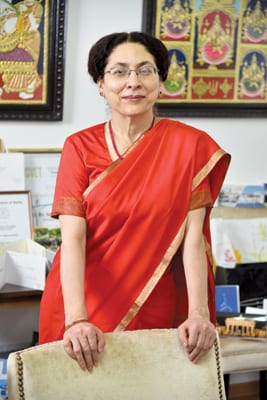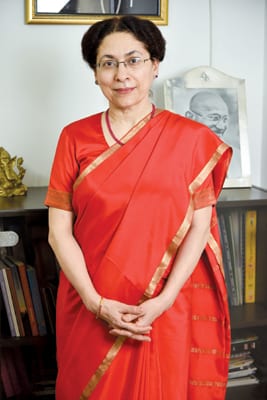We see Serbia not only as a market of seven million people but also as a base to access 15 per cent of the world market, due to Serbia’s special trade arrangements with the EU, Russia, Turkey, Belarus, Azerbaijan, Kazakhstan, CEFTA etc
Serbia is a regional hub thanks to its favourable geographical location. It is the transport corridor linking Western and Eastern Europe. All shipments reach European capitals within 24 hours. Serbia, as a transition economy, has passed through a period of dramatic economic change over the recent past, and the major fiscal and structural reforms are undertaken by the Serbian government have resulted in a significant improvement of the economic situation and the business environment in Serbia.
This message was eminently conveyed by PM Vučić in India during the Vibrant Gujarat Summit 2017. This summit has proved very useful in terms of investments, with a total of 25,578 MoUs signed during the event, which included the participation of over 33,000 people from all around the globe – says H.E. Narinder Chauhan, Indian Ambassador to Serbia.
Your Excellency, you recently participated actively in the Vibrant Gujarat Global Summit 2017. What was the most important message you took away from this major gathering?
– Vibrant Gujarat has emerged as one of the foremost economic summits in India. The participation of PM Aleksandar Vučić in the summit proved to be a major forward movement in India-Serbia relations and I am sure the visit will further enhance relations between our two friendly countries.
The summit saw one of the largest gatherings of Heads of State/Government, Ministers, top global & Indian CEOs, Nobel Laureates, Economists, Academics etc. The summit further helped in connecting India to the world. The summit has also proved very useful in terms of investments, with a total of 25,578 MoUs signed during the event, which included the participation of over 33,000 people from all around the globe.
The two leaders expressed satisfaction at the excellent bilateral relationship and agreed to promote economic cooperation, including in food production, agriculture, pharmaceuticals, defence, health, tourism and IT
Which topics were addressed at the meeting between the Indian and Serbian Prime Ministers?
– The talks between the two PMs were held in a very warm and friendly atmosphere. Both sides reviewed international and regional issues. The two leaders expressed satisfaction at the excellent bilateral relationship and agreed to promote economic cooperation, including in food production, agriculture, pharmaceuticals, defence, health, tourism and IT.
PM Vučić also shared the stage with PM Modi and, addressed the Plenary Session of the Vibrant Gujarat Global Economic Summit. In his meeting with Mr Vijay Rupani, Chief Minister of Gujarat, PM Vučić discussed the possibility of investment in the fields of chemicals, agro products, IT and pharmaceuticals. PM Vučić visited Mumbai, India’s financial capital, where he addressed the CEOs Forum and met the Chief Minister of Maharashtra.
I am confident that these high-level meetings will help realise the full potential in expanding two-way trade & investment, in order to boost economic growth, sustainable development, research, innovation and entrepreneurship.
How did you view Serbia’s appearance at the Vibrant Gujarat Global Summit 2017, which brought together participants from 100 countries, including the worlds economically and politically strongest nations? How can a small country take advantage of participation in such a gathering?
– The Vibrant Gujarat Summit has catapulted itself into one of the most significant and sought-after global platforms, where PM Vučić showcased Serbia as a business destination. Mr Anand Mahindra, President of the Mahindra Group, acknowledged the political stability and secure market of Serbia for investors. PM Vučić informed participants about economic reforms and progress made in terms of Ease of Doing Business. During his meeting with Mr Devendra Fadnavis, Chief Minister of Maharashtra, PM Vučić discussed enhanced cooperation in Agri, food processing, tourism & IT. He invited Mr Fadnavis to lead a business delegation to Serbia. In his meeting with Mr Pankaj Patel, President of FICCI, PM Vučić focused on the improvement of institutional and business cooperation & the mutual promotion of Serbia and India as tourist destinations. Cooperation in defence and the film industry was also discussed. The talks were meaningful, important and useful, and I am sure the visit will result in increased exchanges.
Both Indian and Serbian officials mention the good relations between our two countries, which date back to the Yugoslav era and the time of Indira Gandhi and Josip Broz Tito, as well as the Non-Aligned Movement. However, how does today’s India view Serbia, beyond that historical context?

– India-Serbia bilateral relations are marked by mutual understanding and support on issues of core interest. There is space for the enhancement of trade & investment, including through existing Agreements on Investments, Taxation, biotechnology for food, energy efficiency, new materials, tourism, air services, agriculture, IT & electronics etc. Working Group meetings have come up with concrete ideas. We hope that the results of the just-concluded visit of PM Vučić will provide a strong impetus for the development of our relations in all spheres. The discussions in India reflect a joint desire to broaden areas of cooperation for further progress and prosperity. Serbia is an emerging economy and has the potential to become a gateway not only to the Balkans but also to Europe and the CIS. I am hopeful that the official talks between the two sides will yield fruitful results and enhance bilateral collaboration in all sectors.
Economic cooperation between India and Serbia is at a very low level. How can cooperation be improved between India, as one of the world’s biggest economic powers, with the highest rate of economic growth, and Serbia, which is a small economy that is only just emerging from the recession?
– Serbia is fast emerging as one of the leading investment locations in Central & Eastern Europe. As a step forward, the India-Serbia Business Forum was launched in June 2016 in Belgrade, where an emphasis was placed on identifying bottlenecks. The exchange of visits, both at the political and the commercial levels, is very important. Dr Jitendra Singh, Minister in the Prime Minister’s office visited Belgrade in October for broad-based discussions. These recent high-level visits from both countries are positive developments. We also expect the third session of the Joint Economic Committee to take place soon, with a view to identifying ways to further enhance cooperation.
In one interview you said that India sees Serbia as a gateway to the billion consumers in the European Union and the Commonwealth of Independent States. Do you believe that such a view of the situation can also be adopted by investors from India, who were invited to invest in doing business in Serbia at the Vibrant summit?
– We see Serbia not only as a market of seven million people but also as a base to access 15 per cent of the world market, due to Serbia’s special trade arrangements with the EU, Russia, Turkey, Belarus, Azerbaijan, Kazakhstan, CEFTA etc. Serbia is a regional hub thanks to its favourable geographical location.
It is the transport corridor linking Western and Eastern Europe. All shipments reach European capitals within 24 hours. Serbia’s key strengths are political stability, low-cost economy and highly capable human capital, in addition to the customs-free access to 15 per cent of the world market.
Serbia, as a transition economy, has passed through a period of dramatic economic change over the recent past, and the major fiscal and structural reforms are undertaken by the Serbian government have resulted in a significant improvement in the economic situation and business environment in Serbia. This message was eminently conveyed by PM Vučić in India.
Is it possible to implement the idea of a partnership between India and Serbia in the field of agriculture?
– Agriculture and food processing, as well as agricultural machinery, are crucial industry segments in bilateral trade with good growth potential.

Serbian agricultural exports to India comprise mainly tobacco, whereas Indian exports to Serbia include coffee, sesame seeds, groundnuts, cattle feed, dried onions and grapes. India also exports tractors of the Mahindra, TAFE and Sonalika brands, as well as Jain Irrigation equipment to Serbia. Very constructive ideas have emerged from the Working Group on Agriculture, which met recently.
Serbia has the potential to grow soybeans, oilseeds and other crops for India. In addition to excellent raw materials and conditions for producing high-quality, healthy food in Serbia, India can also enjoy strong support from Serbia’s widely recognised seed and crop research institutes. Serbia is also interested in importing tropical fruits like mango, pineapple, papaya and banana, as well as increasing exports of fresh, frozen and processed fruits and vegetables.
The exchange of experiences in the field of seed production and joint production of seed material is an important part of our future cooperation. India has a policy of 100 per cent FDI that could be taken advantage of by Serbia. Marine products from India represent another sector that could be explored.
Serbia is an emerging economy and has the potential to become a gateway not only to the Balkans, but also to Europe and the CIS. I am hopeful that the official talks between the two sides will yield fruitful results and enhance bilateral collaboration in all sectors
Apart from the defence industry, pharmaceuticals and agriculture, the Serbian delegation also expressed a desire to strengthen cooperation between the two countries in the IT sector, based on the bilateral agreement signed by India and Serbia last year. How is that agreement being implemented?
– In both India and Serbia, the bulk of the GDP comes from the services sector. Thus, we are natural partners. Under the recently signed bilateral MoU on IT & Electronics, cooperation will be enhanced by using IT as a tool to improve public service delivery, i.e. e-learning, e-government services, telemedicine, e-education, e-authentication, cybersecurity, internet-governance, e-commerce etc. Concrete projects will be identified during the forthcoming meeting of the working group on IT & Electronics.
During December the Embassy of India, in collaboration with the Serbian Ministry of Tourism, held a meeting dedicated to tourism (India-Serbia touristic workshop). What are the chances of two close but geographically distant countries linking up in the domain of tourism?
– Today tourism is a major driver of economic growth globally. In view of the fierce competition in tourist generating markets, it is necessary for both countries to cooperate in order to strengthen promotional and marketing efforts. Our e-Tourist Visa (eTV) facility is gaining popularity among Serbian visitors. We have regularly participated in Serbian Tourism Fairs since 2013. The bilateral Air Services Agreement has been revised to promote better connectivity.
In 2016 there was 26 per cent year-on-year growth in the number of Serbian tourists visiting India. The Tourism Workshop of December 2016 brought together tourism organisations, tour operators etc., in order to create awareness. In the reverse direction, a familiarisation visit of Serbian tour operators to India will be organised. PM Vučić’s interaction in Gujarat and Mumbai including with India’s largest tour operator, SOTC Group, were also very fruitful in this direction.
You once mentioned that Serbia is also promoted as a location for shooting Indian film productions. Minister Ana Brnabić says that Serbia has earned €4 million from that kind of cooperation. Could that figure be higher?
– Bollywood is a rage and Indian films shot abroad serve to promote tourism, as these locales are seen by a billion people. Serbia is emerging as an attractive filming location, offering pristine nature and elegant city scenes, apart from world-class studios and a highly skilled workforce.
The Indian film “Oopiri” – a remake of the French film “Untouchables” – was shot in Serbia and received a good response at the box office. This film has opened the doors to other Indian productions and I feel that Serbia could be a strong regional competitor for film shooting.